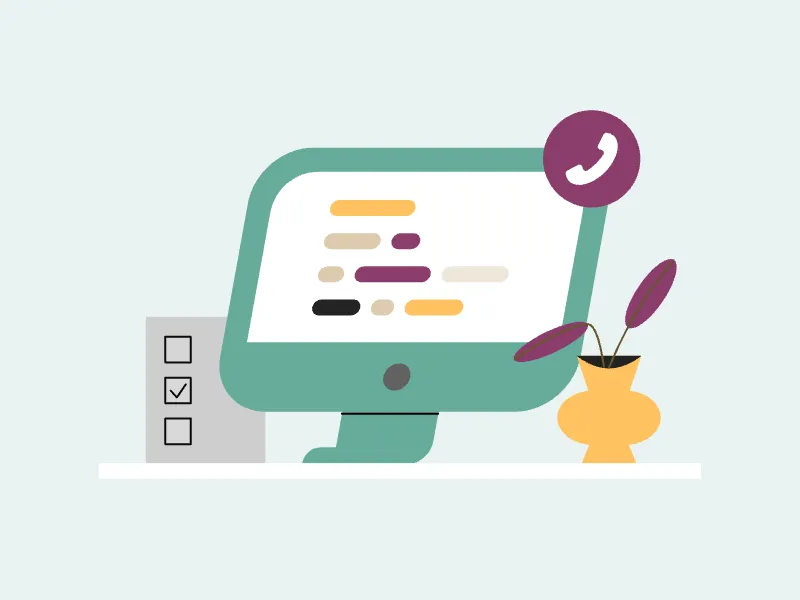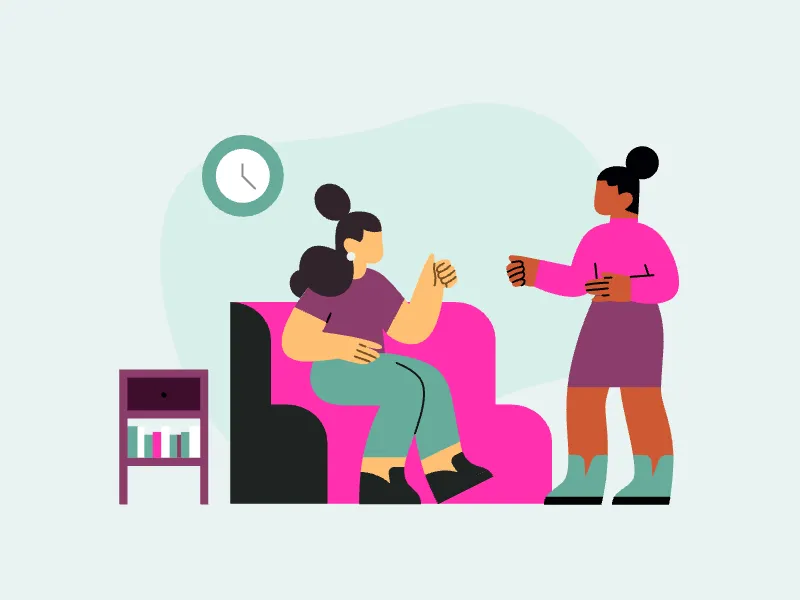How to seek help for eating disorders: Recognize the signs
The first step in how to get help for an eating disorder is recognizing that you need help.1 These conditions are serious mental health issues that almost always need outside assistance and treatment to overcome.
Some people may be willing to see and accept the need for help right away, while others may take a bit longer to come to terms with their situation. Everyone is different.
However, knowing the signs of an eating disorder can help you or your loved one get a better perspective on what's going on and empower you to reach out for professional treatment.
Common eating disorder signs and symptoms
Every eating disorder presents differently, although they are nearly all characterized by an unhealthy relationship with body image, food, eating, and/or movement.
People with eating disorders often struggle with isolation, eating meals alone, withdrawing from friends and family, and feeling extreme shame associated with their behaviors, which can make it hard for them to reach out for support for eating disorder behaviors.2
People with eating disorders often struggle with isolation, eating meals alone, withdrawing from friends and family, and feeling extreme shame associated with their behaviors, which can make it hard for them to reach out for support for eating disorder behaviors.2
Did you know that eating disorder treatment can be done remotely?
Learn more More specific signs and symptoms vary by condition.
Anorexia nervosa symptoms
Anorexia nervosa involves severely restricting food intake, which makes it hard to maintain a healthy weight. Common
symptoms of anorexia nervosa can include:
3- Extreme fear of gaining weight
- Engaging in restricted eating
- Preoccupation with weight loss or thinness
- Distorted body image
- Self-esteem that is dependent upon body shape and weight
- Feeling tired or lethargic much of the time
- Frequently feeling cold
Bulimia nervosa symptoms
Bulimia nervosa is characterized by binge eating episodes followed by purging episodes, in which a person engages in compensatory behavior, such as self-induced vomiting, fasting, laxative use, or excessive exercise.
Symptoms of bulimia nervosa may include:
3- Feeling out of control during binge eating episodes
- Feeling ashamed after binge eating episodes
- Persistent sore throat
- Swollen glands in the jaw and neck
- Sensitive or decaying teeth
- Gastrointestinal issues like acid reflux
- Intestinal irritation from laxative misuse
- Dizziness from dehydration
Binge eating disorder symptoms
Binge eating disorder involves recurring episodes in which an individual eats a large amount of food in a short period of time, and they often report feeling out of control during this episode. Unlike people with BN, people with binge eating disorder don’t compensate for the episode by purging.
Symptoms of binge eating disorder may include:
3- Eating extremely large amounts of food in a relatively short time
- Eating even when you aren’t hungry
- Continuing to eat when you’re full
- Eating incredibly fast
- Feeling guilty or ashamed about eating episodes
- Eating by yourself due to shame
How to get help for an eating disorder: Treatment programs
Treatment for eating disorders is necessary in nearly all cases. But it's possible to treat eating disorders in a number of ways, with different therapies and programs available in various levels of intensity. This can make the process of finding help feel overwhelming or intimidating.
If you're wondering how to get help for an eating disorder but aren’t sure which program is right for you, you can receive an assessment from your physician or psychologist. Once they complete your evaluation, they can refer you to an appropriate treatment setting based on your needs.
Other factors you should consider when choosing an eating disorder treatment program include:
4 - Treatment setting: Decide whether you want to attend inpatient, partial hospitalization, intensive outpatient, or outpatient treatment.
- Location: Decide whether you want to attend treatment close to home or want to travel to a new city or state for care.
- Cost: Establish your budget before comparing treatment programs in order to find one that won’t break the bank.
- Insurance coverage: If you have insurance, search for programs that are in network with your insurance.
- Treatment approach: Although every accredited recovery program should utilize evidence-based treatment modalities, programs may differ in their approach, such as integrating using holistic or experiential therapies.
Places to get help for eating disorders
Not all eating disorder treatment programs are created equal. Some programs are better for certain people or certain conditions. If you're wondering how to get eating disorder help or how to get help for an eating disorder, it's important to understand your options.
Here are some things to look for in a treatment program for disordered eating behaviors:
1. Individualized treatment planning
The treatment team tailors your treatment plan to meet your specific needs, eating disorder behaviors, history, goals, and beyond.
Research has suggested that an individualized approach to treating eating disorders is so important, as a review of the literature showed that no single treatment approach outperformed others.5 This highlights the need for personalized treatment planning, which takes a person’s unique needs into account.
2. Evidence-based treatment modalities
A quality eating disorder treatment program will utilize evidence-based therapies, such as cognitive behavioral therapy (CBT), dialectical behavior therapy (DBT), and acceptance and commitment therapy (ACT).6
Evidence-based therapies have been extensively tested and are widely considered the best clinical options to help a person with an eating disorder.
3. Culturally-responsive treatment providers
To best offer support for eating disorder patients, treatment teams should provide culturally-responsive and culturally-sensitive care that understands and respects the differences in patients’ beliefs, backgrounds, and experiences.
Culturally-informed eating disorder treatment includes using culturally-sensitive interventions, addressing cultural barriers to treatment, becoming educated about working with ethnic and racial minorities, and using a culturally flexible diagnostic model.7
{{link-bank-one-column}}
4. Accreditation
When comparing treatment facilities, make sure to check out if they are accredited by nationally recognized organizations, such as the Commission on Accreditation of Rehabilitation Facilities (CARF) and the Joint Commission on Accreditation of Healthcare Organizations (JCAHO). These certifications indicate that a program has been evaluated by industry experts and found to meet or exceed industry standards.
5. Staff credentialing
Knowing who helps with eating disorders is a good step to take before committing to a program. You can browse the staff list and make sure that the treatment team has the appropriate credentials for care, such as MD, RN, PsyD, LPN, LMFT, LCSW, and more.
6. Co-occurring disorder treatment available
Research indicates that anywhere between 55 to 97% of those diagnosed with an eating disorder also receive a diagnosis for at least one more condition, such as depression, anxiety, post-traumatic stress disorder, and substance use disorder.8
When considering how to help with an eating disorder, it's important to look for a program that offers integrated, dual diagnosis care to fully address all relevant mental health conditions.
7. Aftercare planning
Because recovery is a lifelong process and requires ongoing support, your treatment team should work with you near the end of your program to create an aftercare plan tailored to your needs. This can help someone continue to receive support for eating disorder symptoms long into their recovery journey.
8. Payment plans
Unfortunately, how to get help for an eating disorder is often expensive. Many treatment centers acknowledge this financial burden to care and work to increase accessibility to their program through flexible financing options.
You can—and should—also reach out to your health insurance provider to see if they are willing or able to cover certain programs, treatments, or doctors. Even if they will cover treatment, make sure you get the details. Many insurance plans have coverage stipulations.
9. Inclusive care
Eating disorders don’t discriminate, and therefore, neither should treatment providers. Eating disorders affect people of all body types, ethnic and racial backgrounds, sexual orientations, gender identities, and socioeconomic statuses.
There is a preconception that the typical individual living with an eating disorder is a young, thin, heterosexual woman. This is a dangerous misconception.
Research shows that those identifying as BIPOC (black, indigenous, or person of color) are less likely than their white counterparts to be asked by their doctor about disordered eating and only half as likely to receive a diagnosis or treatment for an eating disorder.9
When thinking of how to help a person with an eating disorder, look for a treatment program that prioritizes inclusivity and practices anti-racism.
10. Trauma-informed care
Because there are strong links between trauma and eating disorders, quality programs must use a trauma-informed approach, which understands how trauma has affected each individual’s prognosis, symptoms, and overall health.10
You might be interested in
Who helps with eating disorders?
At an eating disorder treatment program, you will be surrounded by a compassionate and caring treatment team, which may include a combination of the following:11
- Psychiatrist: They can meet with you and prescribe psychotropic medications to treat co-occurring mental disorders, such as anxiety or depression.
- Nutritional counselor: They provide you with meal planning help, nutrition education, food exposure, and food-related skills you need to feed yourself.
- Physicians and nurses: They provide much-needed medical care and monitoring throughout your stay to ensure any physical health concerns are addressed and treated.
- Psychologist, psychiatrist, and/or therapist: With specific experience in treatment with eating disorders, therapists can provide individual and group counseling, using a range of techniques and therapies to help you meet your goals, cope with unwanted emotions, rectify maladaptive behaviors, heal your relationship with food and movement, improve distress tolerance, and improve problem-solving skills.
- Family therapist: They provide family therapy with either you and one family member, several family members, or a spouse to improve relationships and communication and to facilitate healing.
- Movement specialist: They provide you with a safe space to move joyfully, without judgment, while healing your relationship with your body and movement.
- Art therapist: They facilitate guided art therapy sessions that encourage you to express yourself through painting, music, drawing, writing, and more.
Getting help for eating disorders at Within Health
When thinking of how to get eating disorder help, you may also want to consider virtual options. These programs generally open up availability to those who may not otherwise be able to receive more traditional care, and they are usually more cost-friendly than in-person treatment.
At Within Health, we offer a revolutionized virtual treatment program with a high frequency of care comparable to partial hospitalization programs but allowing you to recover from wherever you feel most comfortable.
Through our treatment app, you have easy access to your entire dedicated care team, from dietitians and therapists to nurses and your Care Partner. And treatment is flexible, working around you and your schedule.
Much like in-person care, you attend a variety of treatment sessions, including:
You also receive after-hours support for those days that you need extra care and attention. And we understand how stressful it can be to plan meals and cook, so we send personalized meal kits directly to your home. And thanks to our numberless scales and blood pressure cuffs, we can provide remote medical monitoring to ensure your progress and safety.
If you are interested in learning more about how to get help for an eating disorder at Within Health, you can call our eating disorder intake team now.
Get help > 


















.webp)




